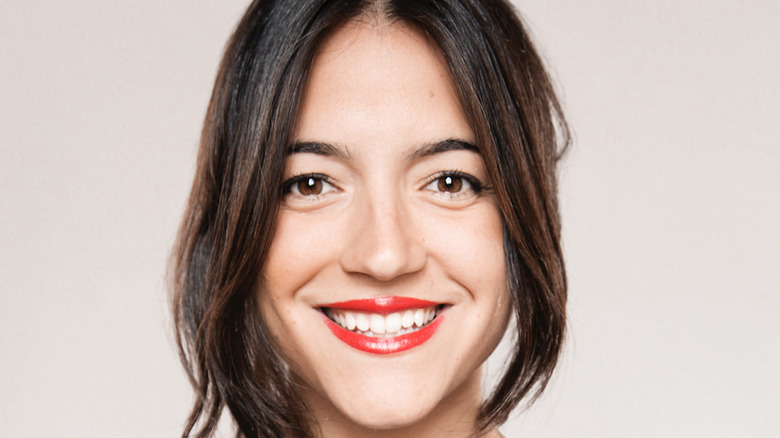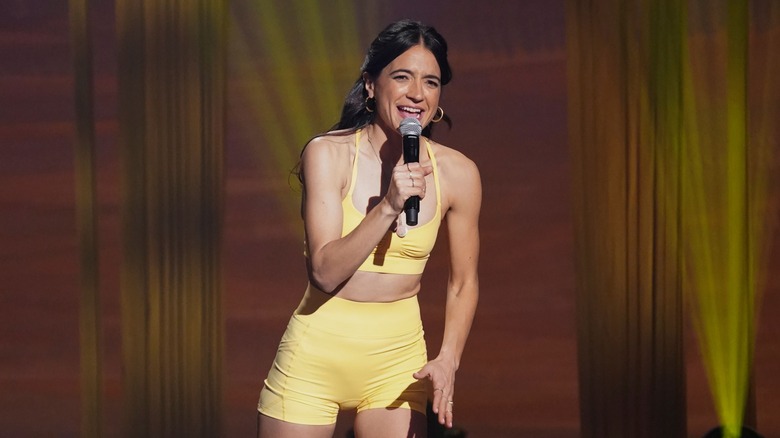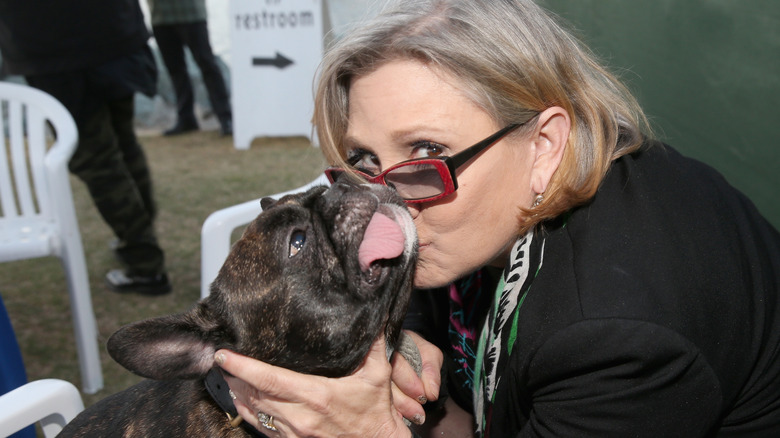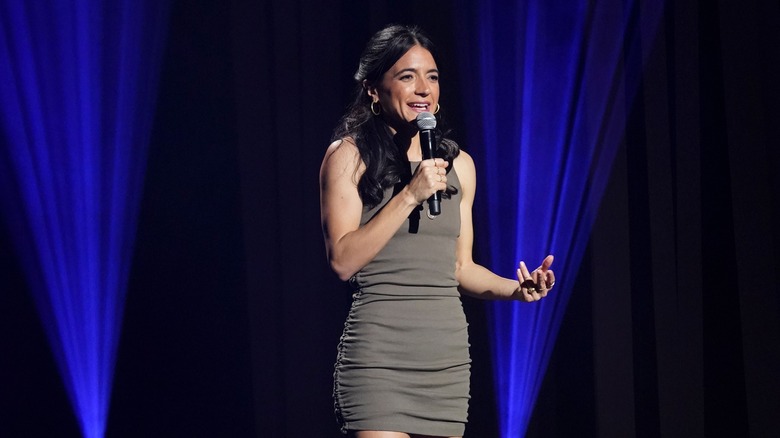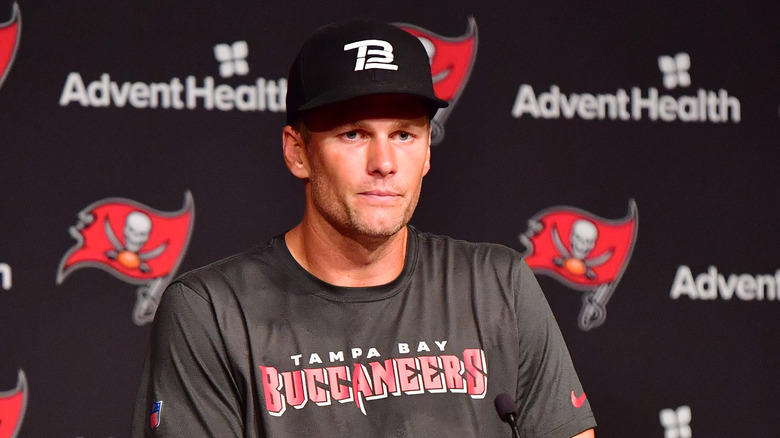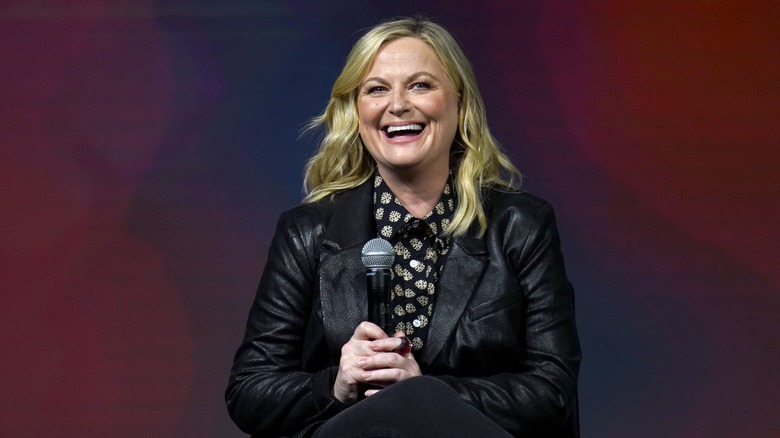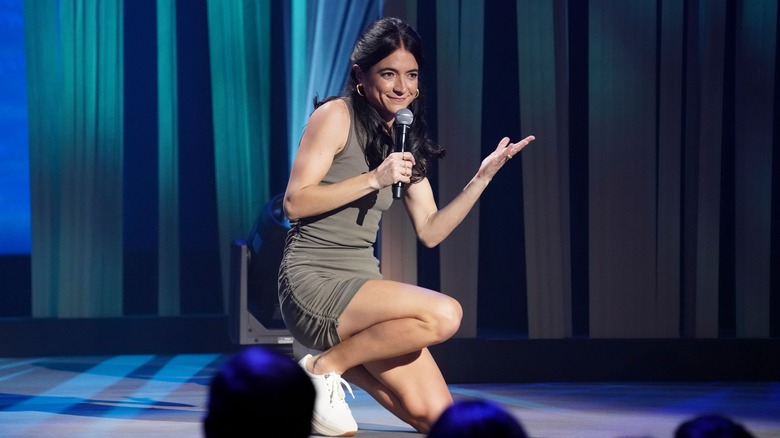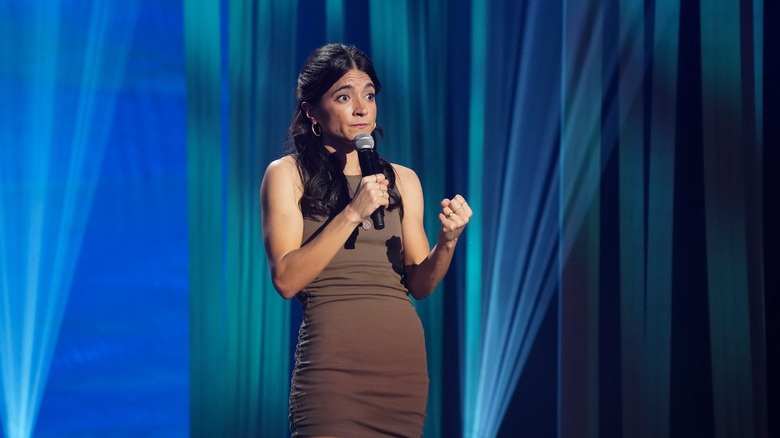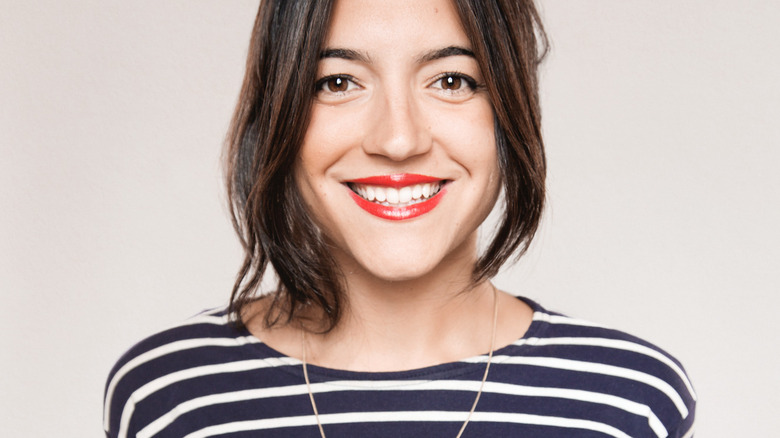Alyssa Limperis Talks No Bad Days, Tom Brady, And Turning Trauma Into Comedy - Exclusive Interview
From viral TikTok videos to Peacock comedy specials, comedian Alyssa Limperis can elicit laughter or tears from her audience at the drop of a hat. As an alumna of the famed Upright Citizens Brigade improv theater, Limperis garnered the attention of comedy fans and bored TikTokers alike when she released her mom parody videos on the app. The skits include gems like "Mom On Vacation," "Mom When I Visit Home," and "Mom With Technology."
While some moms would be less than thrilled at the prospect of having their most prominent quirks and adages immortalized (and lightly roasted on the internet), Limperis' mom takes it in stride — and both use the videos to heal from the loss of Limperis' father.
The comedian has stepped far beyond short video clips on TikTok, however. Long before Peacock picked the act up for a special, Limperis performed her "No Bad Days" show for audiences all around the country. The special is a love letter to Limperis' father and grief itself alongside humorous moments from the comedian's life. As touching as it is funny, the show takes audiences in every direction and more. And when Limperis isn't lighting up TikTok and performing her show, she's hitting the commercial scene with stars like Tom Brady.
During an exclusive interview with The List, Alyssa Limperis discussed her Peacock comedy special "No Bad Days," how she goes about healing grief with comedy, her comedic inspirations, and what it was like working with her dad's hero, Tom Brady.
Keeping it in the family
You cover your family a lot in "No Bad Days." How do you brainstorm new material from that era of your life, and what has the reaction been from your mom when you talk about your dad in your act and when you do impressions of her?
I'll start at the tail end of that. My mom loves the impressions, and we do them together. The videos have become a thing we do together. Sometimes, she'll get recognized, and it's a fun thing, but she's a great sport. She really likes doing them with me, and we do them together to avoid a feeling of me doing something at her versus [that] we're doing this together. She'll say something, and we'll be like, "That's a line." It's almost like we both are in the writer's room together whenever we're hanging out.
[The] first version was I didn't have to brainstorm anything because it was all so ... when I say [the] first version, I did a rendition of this show a while back right after my dad died.
I feel in that capacity, I wasn't brainstorming. It was almost filtering out what not to say because I had so much I wanted to say about what had just happened. When I revisited the show in this most recent rendition, in a way, it was less about my family, and the edition was more about me. I noticed in that first show, it was all about my dad and the experience of losing him, and I probably wasn't able to look at myself in that realm because I was so deep in it.
Five years later, I got to look back and be like, "Where was I then? What was happening in my life, and how have I changed since then?" It was more looking at my own self, which was a little bit easier to think of because it's myself.
Living by the words of the late, great Carrie Fisher
There's a Carrie Fisher quote from "Wishful Drinking" that I think about a lot. She describes talking to her daughter, who is endlessly laughing at a sardonic quip that Carrie made about some family drama, and Carrie said, "Baby, the fact that you think that's funny is going to save your whole life." How do you go about turning painful family memories and channeling loss into comedy, and why do you think it's such an important coping mechanism for both comedians and really anyone to employ?
I love that quote. I suppose that's really it. Life is going to be hard all the time. Whether you miss the train and you're like, "Now I'm late, and you miss..." That's hard, or it's death. Both things are hard, and sometimes people even say that when my dad was dying, they're like, "I don't want to complain because..." No, hard is hard, and life is hard all the time.
The ability to laugh can save you because it's like, "It's not to say it undoes the bad, but it's also finding a moment of levity in here to not fully sink." Okay, this is bad, but we can still laugh. We can still connect." I remember I was crying one time with my friend on the phone, and she was crying, and then someone made each other laugh, and then we both started laughing.
It breaks it. It breaks it for a second. You go, "We're here. We're still okay. We're not falling down. We're experiencing this moment, but we're still laughing together." I talk about it in my show, but I felt almost like I owed it to my dad. How dare I not laugh through or have a happy time in these next years I have left when all he wanted was time. With the terrible time he had, he was able to make the absolute most of it.
He was able to ski. I have this picture of my dad cross-country skiing on a patch of snow. It's mostly grass, but there's a patch, and my dad's got his skis out. He was such an eternal optimist, and if he could do that during those really dark, terrible days, then I felt like, "How could I not? How could I not as well?"
A kaleidoscope of comedy
"No Bad Days" is a mash-up between a piece on loss, a motivational speech, and stand-up comedy. How did you decide on that dynamic, and were you inspired by any other comedians or comedy specials?
Totally. Yes, to all of it. I definitely was inspired by so many comedy specials that are bending and breaking the barrier of comedy. I loved Gary Gulman's "The Great Depresh" [and] Moses Storm's "Trash White," [and] we both had the same director, Lance Banks. [They're] comedy specials that are funny but are also delivering a message.
I was doing this as more of a way to talk about this when it all happened. This was years ago, I was doing it in basements, and the reason I wanted to make it mashed up then was because I felt like that's what my life was. [When] I started as a comedian, my life got upended. I had to go into this grief, and I wrote very honest blogs about grief that weren't funny.
I would do a lot of dance when I was at home. My one piece of relief was running and dance. It was like, "These are all real parts of my life — how can I put these all together?" I like that things happen close to each other that are very different, because that, to me, is very real with mental health or grief is that things can change quickly and fast, and it's not fluid or one way. It's always changing, and I wanted that feeling to be present in my special as well.
You dive deep into past relationships and high school material as well. Has anyone from your past ever reached out either in anger or to reconnect after a set?
No, not really. One of my best high school friends, Jean, was sitting in the front row of my show, and they didn't even know she was my friend. She got sat in the front row, so that was really nice to see her there. You know that story I tell where I'm at the table in the cafeteria? She was at the table [in] the cafeteria, so she was right there. No, I haven't had anyone, but we'll see. We'll see if anyone reaches out. We'll see if Stephanie reaches out after this. A lot of people will always be like, "Don't put me in the act." That happens a lot.
Do you do it then anyway out of spite?
Yeah, but it's always someone who you would never put in your act. It's your dentist. It's like, "I'm not putting you in my act. What would I say?"
Improvising with Tom Brady
You worked with Tom Brady on a series of Hertz commercials where you got to lightly roast him. Are you a big football fan, and what was it like working with him? Were you nervous, or did that dynamic come naturally?
It was this beautiful thing because my dad was a really big fan of Tom Brady. I'm from Massachusetts, and I shot those right before I shot this. It was this beautiful harmonious thing [where] I'm saying goodbye to my dad and ... My dad loved Tom Brady. My mom wanted to try to get Tom Brady to come visit him when he was sick. I don't think she ever followed through with it, but there was this beautiful moment where I was like, "I'm doing this special where I'm talking about my dad, and I'm meeting my dad's hero, and he's wonderful, and we're ribbing each other, and we're having fun."
I felt so comfortable with him because I feel like I'd grown up watching him, so it was a really awesome, special experience. For the two of them to happen at the same time was really cool.
What were some of the most memorable moments from that experience, and were there any funny moments or outtakes during filming?
The best part was that they let me improvise a lot. At a certain point, the line was, "You're from California, aren't you?" or something. I was like, "I'm from Boston," and then I dropped into a Boston accent. I was like, "You remember Boston?" Without skipping a beat, he dropped into a Boston accent, and then there was the two of us sitting in chairs, talking in Boston accents. I was like, "This is pretty cool."
The big leagues
You got a big break in the Upright Citizens Brigade, which has produced a slew of talent from Amy Poehler, Tina Fey, Aubrey Plaza, [and] Ellie Kemper. Is it surreal at all to be grouped in with such icons, and have you gotten the chance to chat with or work with any of them over the years?
I'm very flattered that you put me in that group, and it is very flattering to be next to them. No, I haven't gotten to work with anyone from that list, though I work with UCB Improv people all the time. I just shot something with John Gabrus, who's so funny. I shot this movie with Fred Armisen, who's great.
I actually remember reading ... my brother went to Princeton, and before I knew that [comedy] was a viable career that you could do this, there was a Princeton magazine, and there was a profile on Ellie Kemper. I remember reading it and feeling so inspired because what she was talking about felt similar to me. I remember being like, "Oh, it's possible. You can do this." Maybe I'll meet Ellie and tell her that one day.
Who would be your dream person [or people] to collab with?
I really adore Steve Carell and everything he does. His ability to be so funny and so real is very inspiring and motivational to me. That would be a treat.
Journey to comedic success
Who are some of the most surprising people that have come to your shows, if there are any?
I did these shows on the road mostly, so I don't know if I have a direct answer to that question, but I was surprised by the types of people who would come up to me after the show and say that it spoke to them. I was going to all different parts of the country and I'm used to doing this show in New York or LA for mostly people who are in my age category or similar lifestyles. To be able to do this show on the road and have people of all ages and people who do different jobs than me or who I met in Indiana or Texas come up to me and say that they related — life is weird, and it can feel so personal.
Everything can feel like you're the only one experiencing it. Going on tour helped me be like, "This is universal. We're all on this boat together, and everyone on this boat is not that different. We live in different places. We look different, we wear different clothes, but everyone's, at the core, similar and dealing with similar pains and joys." That was an exciting discovery of the road with this show.
What has it been like through your journey of success from doing improv, making these successful mom impersonation videos, selling out audiences, and even getting your own comedy special on Peacock?
I remember quitting my job. I worked in finance my first year out of college, and I really wanted to do comedy, and I'm grateful for that job. It totally was a great way for me to get to New York. I remember feeling, in my body and soul, like every day I was doing something that I wasn't aligned [with]. The day I quit, I started waitressing tables that day. I remember I was biking up 2nd with my shift meal, and I felt such a sense of peace where I was just like, "I'm on the road. I'm on the road every day. I'm working towards what I want, and I'm being honest to myself and my artistic journey."
From that day on, I've felt free. All these accomplishments that you mentioned are exciting steps on that road that I got on all those years back. I feel very lucky. I feel lucky every day to get the chance to do the thing that [makes] me feel free because I know that's such a privilege. I feel very lucky that that's something I get to keep waking up and doing.
Turning trauma into comedy
Do you and your mom have a favorite bit that you've done in one of your videos?
There's this video where I'm moving out of New York, and it's so silly, but I'm on the ground in her pants, and I'm saying, "We're going to get this security deposit back if it's the last thing we do." For whatever reason, it was probably late in the day, [and] we could not keep it together. We were both dying laughing. I probably have 20 minutes of us. It wasn't even the funniest part of the video, but I'll always remember how much fun we had going, "If it's the last thing I do." Sometimes we say to each other, "If I'm going to get the security deposit back..." I'm really grateful for those. Those were such a fun way to spend time with my mom.
That's so funny. Do you have any tips for people to turn their trauma into comedy in their own way?
Do what feels right to you. If comedy is your choice, then great. Letting out your trauma in any way that feels good to you, that's my tip. Find whatever feels right and feels good and go toward that. If comedy is right, then trust that's the way to go. Honesty is always the best policy. Anytime I was stuck on a joke, anytime I couldn't find something, my friend May, who came on the road with me and directed the first stage portion of this show, she'd always be like, "What does Alyssa honestly feel about that?" Every time she'd say that, we got the joke. Don't go for what's funny, go for what's true, and you'll find the funny there.
Audience participation gone wrong
Were there any moments when audience participation went very wrong during a show, and what are some of your favorite touring memories?
They did often. People are good [sports]. One that is fun is I go into the audience to ask if you feel my dad there. I'm in the audience, and we just had this whole moment, and this woman — I'm like, "Do you feel my dad?" She's like, "I really love what you're doing up there." I was like, "Thank you. That's very sweet, but that's not going to help me right now." She kept going.
The opposite of that is just people yelling, "What's happening?" when I'm doing some of the more emotional parts of the show, and me having to bear down and power through. I'm really not too critical of audiences because I was going into places, giving them something that they didn't quite sign up for.
I always felt very, by the end, grateful for the audiences for going on the ride. Oftentimes, I would say, "Who here knows what this is about?" and it'd be one or two hands. It's a lot to get people to go from nothing, so I don't fault them for yelling at me a little bit. They're allowed.
"Alyssa Limperis: No Bad Days" is now streaming on Peacock.
This interview has been edited for clarity.
